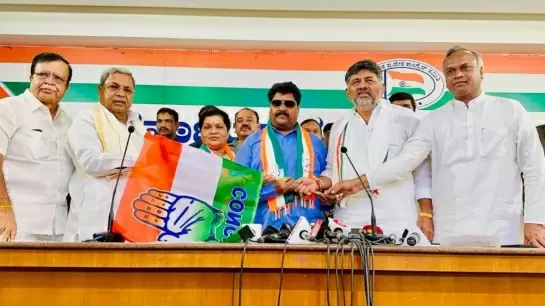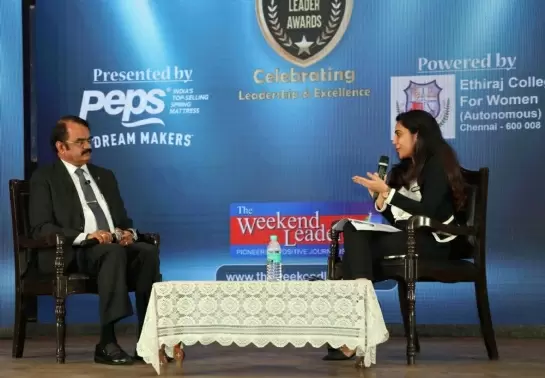Railways first uncovered COVID-19 positive in Tablighi Jamaat
01-April-2020
The deadly spread of coronavirus pandemic in India was stalled in its tracks earlier this week by Indian Railways. It is learnt that vigilant railway authorities first provided an input on March 21 about the movement of Tablighis, at the centre of now exploding controversy. The inputs by the authorities on congregation of people from various COVID-19 affected-countries at Delhis Nizamuddin area of Tablighi Jamaat finally culminated in the state machinery and law enforcement agencies action to trace the Coronovirus positive people across the country, the government said.
And, more importantly, the Indian Railways took social media to flag the issue. The ministry in its tweet on March 21 said: "Railways has found some cases of Coronavirus infected passengers in trains which makes train travel risky. Avoid train travel as you may also get infected if your co-passenger has Coronavirus. Postpone all journeys and keep yourself and your loved ones safe. #NoRailTravel."
This was just a day before Prime Minister Narendra Modi called for Janta Curfew on March 22. A day later law enforcement agencies swung into action and certain Tablighi leaders were summoned by local police station.
But before getting in what happened after March 22, here is a look at Indian Railways series of alerts that finally salvaged the day for the government and its agencies.
Indian Railways alerts:
In series of tweets on March 21, the railway ministry disclosed that four passengers travelling in B1 coach of Godan Express (Train No. 11055) from Mumbai to Jabalpur on March 16 were found positive in COVID-19 test on March 20. "He (Covid-19 positive) came to India from Dubai last week. All concerned officers have been alerted to take necessary action. Such cases are often seen in railways. Passengers are requested not to travel in trains unless absolutely necessary," Indian Railways tweeted.
Thereafter, the railways posted another tweet: "Two passengers marked Home Quarantine were found traveling in the Rajdhani train between Bengaluru and Delhi today (March 21). They were immediately taken off the train and the entire coach was sanitized. Citizens are advised to maintain social distance."
The railways further revealed that on March 13, a total eight passengers, travelling from Delhi to Ramgundam to AP Sampark Kranti Express, were found positive in COVID-19 test on March 20. "Travelers are advised to avoid non-essential travel for the safety of fellow citizens," the railways tweeted.
Travel history:
The inputs provided by Railways in the public domain rang an alarm bell within law enforcement agencies in the Central government. The travel history of Covid-19 positive passengers flagged by railways authorities was checked and all were found to have visited Alami Markaz Banglewali Masjid, the headquarters of the Tablighi Jamaat in the Nizamuddin area of Delhi, during the month.
Suddenly, all the agencies were on their toes. Delhi Police, Intelligence Bureau, Delhi government and other law enforcement agencies swept the area to dig further details.
The agencies stumbled upon startling disclosures that more than 8,000 people from across the country as well as Indonesia, Malaysia, Thailand and Saudi Arabia attended a gathering at Alami Markaz Banglewali Masjid,over a period of a month.
Getting into specifics, they found that as on March 21, there were about 1746 persons staying in Markaz. Of these, 216 were foreigners and 1530 were Indians.
Additionally, about 824 foreigners had been, as on March 21, doing Chilla activities in various parts of India.
Also, a large number of Indian Tablighi Jamaat workers were also engaged in different parts of the country.
The 824 foreigners identity were been shared on March 21 with the state police for identifying them, getting them medically screened and put them in quarantine.
Complete lockdown:
After March 22 successful janata curfew, the Chief Minister of Delhi Arvind Kejriwal announced lockdown of the national capital on March 23 till March 31. On the same day, the Ministry of Home Affairs announced lockdown of 80 cities across India. On March 24 evening, Prime Minister Narendra Modi announced of complete lockdown over Coronovirus threat.
The local police on March 23 asked the people staying at Markaz to leave. By then more than 1000 more people were staying in the premises. They asked for movement of vehicles to Assam and other parts of the country. It was denied.
The Assistant Commissioner of Police (Lajpat Nagar) said that a Tablighi Jamaat was held at the Markaz and it was attended by many people including foreign nationals.
The attendees of the Jamat were already in the mosque when on March 24, 21-day lockdown was announced. He said that thereafter no fresh participants were allowed to enter as the Markaz gates and doors were closed immediately after the lockdown orders.
He also stated an effort on March 23 to decongest and vacate the Markaz premises had to be stopped midway due to extended lockdown.
Till then, the thousands, who attended Jamat spread across India and South East Asian countries, were already commuting in different parts of the country as well in South East Asia.
Death in Jammu and Kashmir:
On March 25, a 65-year-old man died in a Srinagar hospital after he was tested positive for Covid-19 two days ago. It was first Coronavirus related death in Kashmir.
This again raised the eyebrows of the agencies and police.
Rohit Kansal, J&K government spokesperson also said four more persons tested positive for COVID-19 in Kashmir raising the number of infected patients to eight. "Four more persons, all from Bandipora, tested positive today. Preliminary findings suggest they were close contacts of Srinagar patient who tested positive. All five reported to have participated in a religious event", Kansal had said.
These Coronavirus positive patients attended a Jamaat which also had people from Indonesia and Malaysia.
9 tested positive at Andaman:
On March 24, two people among a batch of seven coming from Delhi were sent to institutional quarantine after they were screened at the airport. Rest of them were sent to home quarantine. On March 25, another two people from Delhi came and during screening at the airport they said that they were part of congregation in Nizamuddin. "By the time, news of one person who had attended congregation in Nizamuddin and died in Jammu and Kashmir had spread like wild fire," said a senior IAS officer.
All the nine people'ss sample were tested and they were found to be COVID-19 positive. "Because of them more than 1800 people are now home quarantined and their samples are being checked on regular basis," said the officer adding that all precautionary measures are being taken at the island.
During probe, sources said, it was found that some of them visited anti-Citizenship Amendment Act protest venue at Shaheen Bagh.
Cases in states linked Nizamuddin gathering:
The Tablighi Jamaat Covid-19 scare is spread in 29 states and government is making all efforts to trace the people who had attended and their contacts to break the chain.
The worst affected states were Telangana and Andhra Pradesh.
The agencies found that over 1,300 people - 711 from Andhra Pradesh and more than 600 people from Telangana – likely to be potential carriers of the COVID-19 as they attended the Nizamuddin religious congregation.
The Telangana government said that more than 600 people had gone to Delhi to attend the congregation.
They have deployed 200 teams to conduct enquiries at 463 households after which it was found that 74 persons were suffering from health issues.
In Andhra Pradesh 18 people who attended the Jamaat congregation in New Delhi tested positive so far. Guntur is the most-affected area.
The jolt came on March 30, when six deaths of attendees were confirmed in Telangana. The six people who attended Markaz from March 13 and March 15 succumbed to coronavirus.
Since then both states have woken up to the possibility of community transmission.
Trips to anti-CAA sites:
The agencies during probing travel history found that a few Tablighi Jamaat members made trips to Shaheen Bagh, the epicenter of anti-Citizenship Amendment Act in the national capital.
A few others also visited other protests venue like Jafrabad. "Hunt for Jamaat visitors to anti-CAA sites are launched so that their health condition can be checked and exact dates of their visit to protests sites can be corroborated," said a senior IPS officer.
It was only on March 24 morning protesters at Shaheen Bagh, Jafrabad, Malviya Nagar and other areas were removed.
It was also learnt that the government did not want to rake up controversy by forcibly vacating the protest venue Shaheen Bagh. "It was not advisable," sources said. Multiple sources confirmed the government's decision. Even newly-selected Delhi Police Commissioner S.N. Shrivastva, a 1985-batch IPS officer, was unwilling to take any decision in this regard. Neither any direction from Union Home Secretary Ajay Bhalla was issued.
It when because of medical emergency and threat of transmission of infectious COVID-19 coupled with curfew orders, Shrivastva took decision to vacate the protest venues.
In the meantime, the local police stations were cautioned to keep an eye on people who were protesting so that they are home quarantined.
Government's action plan:
On March 28, state police were advised to collect the names of Indian Tablighi Jamaat workers from the local coordinators, locate them on the ground, get them medically screened and quarantine them.
Sources said NSA Ajit Doval reached around 2.00 a.m. on March 28-29 night at the markaz and convinced Maulana Saad to get the occupants to be tested for the Covid-19 infection and be quarantined.
Shah, Doval knew about the situation building up since the security agencies had tracked down the nine who tested positive at Karimnagar, in Telangana, to the markaz.
Again, State DGPs had been advised by Director of Intelligence Bureau Arvind Kumar on March 29, to trace the movement of all such Tablighi workers in their area, ascertain the people coming in their contacts and take steps for their medical screening. Many States have already started doing this. Kumar is personally monitoring the issue and is in regular touch with concerned people.
So far, about 2137 such persons have been identified in different states. They are being medically examined and quarantined.
The Ministry of Home Affairs also issued a detailed advisory to Chief Secretaries and Director Generals of Police of all states.
This process is still on and more such people would be identified, located and quarantined if necessary.
It is estimated that from January 1 onwards this year, 2100 foreigners had visited India for Tablighi activities. All of them came on tourist visa.
While approximately 824 of them, as on March 21, were dispersed in different parts of the country, approximately 216 of them were staying at Nizamuddin Markaz. Others might have left the country before the lockdown.
The Bureau of Immigration has been sharing (since February 1) with State authorities, details of all international arrivals from affected countries based on self declaration form filled-in by them.
Probe so far:
In Delhi, all the Tablighi Jamaat workers staying at Markaz are being medically screened since March 26. So far 1203 workers have been medically screened.
A total 303 of them had symptoms of COVID-19 and were referred to different hospitals in Delhi. A total 25 have been tasted positive so far.
Rest of them have been moved to different quarantine centres at Narela, Bakkarwala and Sultanpuri. This process will continue to move every Tablighi Jamaat member out of Nizamuddin.
The Delhi Police crime branch has registered and FIR against the organisation on direction of Lieutenant Governor Anil Baijal.
The police said, "a case has been registered against Maulana Saad and others of Tablighi Jamaat under section 3 of Epidemic Disease Act 1897 read with Section 269 (negligent act), 270 (malignant act likely to spread infection of disease dangerous to life), 271 (Disobedience to quarantine rule) and 120-B (criminal conspiracy) Indian Penal Code for violation of government directions.
"These directions were given to the management of Markaz of Basti Nizamuddin regarding restriction of social/political/religious gathering and for taking safety measures, including social distancing for prevention and treatment of COVID-19 viral infection," the police said.
Markaz Nizamuddin's clarification:
Mohammad Shoaib, spokesperson for the Nizamuddin Markaz mosque, said, "Markaz Nizamuddin is the international headquarters of Tabilghi Jamaat for close to 100 years. Visitors/guests/devotees/worshipers from across the globe throng the place for pre-scheduled programs lasting for no more than 3-5 days."
He said that all the programme were decided a year in advance in order to facilitate visitors from far-off places to plan their participation.
When Prime Minister announced the Janta Curfew, for March 22, the ongoing programme was discontinued immediately, however due to sudden cancelation of rail services across the country on March 21, a large group of visitors who had to depart by way of railways got stuck in the Markaz premises.
On March 22, Janta Curfew was observed and accordingly visitors were advised not to venture out until 9 p.m. The plans to move back to their native places by way of means other than railways also did not materialize.
Before the Janata Curfew could be lifted at 9 p.m, the Chief Minister of Delhi Arvind Kejriwal announced lockdown of Delhi beginning at 6 a.m. on March 23 thereby further diminishing any chances of these visitors availing road transport.
"Despite this challenging situation, with the help of Markaz administration, around fifteen hundred visitors left Markaz Nizamuddin by availing whatever meager transport was available," Shoaib clarified.
What is Tablighi Jamaat?:
Tablighi Jamaat, means group of preachers, was floated by Islamic scholar Maulana Muhammad Ilyas in 1926 in then Mewat province. Maulana Muhammad Ilyas Kandhlawi was an Islamic preacher from the Deoband school.
Unlike some other Muslim jamaats, it works only among Muslims. It is believed to have millions of active members in more than 150 countries. They invite Muslim community to adhere to the basic tenets of Islam. The Tablighi network is strong across the Indian sub-continent and people from various walks of life are associated with the organisation.
Tablighi bands of preachers operate from different mosques. Public announcements are made about 'Jamaat' arrival from other cities and countries in the mosques which operates under the control of the parent organisation. They do 'gasht' or knocks the door in the neighborhood, interacting with Muslims, inviting them to 'namaz' and 'ijtema' at the mosque. The preachers, who usually venture out on 40-day mission, stay in mosques. With congregational prayers restricted in the wake of lockdown, majority of preachers had vacated the mosques and made trips to other parts of the country, probably to stay away from the agencies radar and lie low for a while. IANS
After Six Years of Profitable Bootstrapping, Medulance Raises Rs 25 Crore to Expand Nationally
IIM Grad and First-Generation Entrepreneur Anish Popli's ProcMart Secures Rs 250 Crore in Series B Funding
First Indian Space Tourist Talks Dreams and Inspiration Before Blue Origin Flight
Former MLA Rathod Bapu Rao Switches from BJP to Congress in Telangana
Zerodha Co-Founder Nikhil Kamath Launches 'WTFund' to Support Young Entrepreneurs








